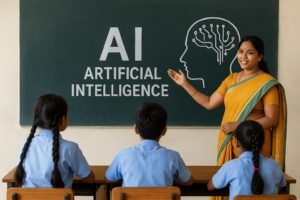President Donald Trump’s second term is already reshaping the U.S. economy by taking a lot of measures in education, investments, and foreign deals. The White House, with Donald Trump’s collaboration, is all set for $3 trillion in new U.S. investments. This includes a historic $550 billion trade agreement with Japan, and AI education initiatives in partnership with Microsoft nationwide, as per White House. Want to learn more? In this article, get to know more about the White House Trump Effect in 2025, including new investments, trade deals, and commitments that are shaping America’s economic future.
White House & Trump Effect: New U.S. Investments Explained
The Trump Effect, highlighted by the White House, has made major corporate pledges of over $3 trillion in new U.S. investments across key sectors:
|
Company/Project |
Investment Amount |
Sector/Focus |
|
Apple |
$600B |
U.S. manufacturing & workforce |
|
Project Stargate (SoftBank, OpenAI, Oracle) |
$500B |
AI infrastructure |
|
NVIDIA |
$500B |
AI supercomputers |
|
Micron Technology |
$200B |
Semiconductor manufacturing |
|
IBM |
$150B |
U.S. operations expansion |
|
TSMC |
$100B |
Semiconductor production |
|
Johnson & Johnson, AstraZeneca, Roche |
$50B+ (combined) |
Pharma R&D |
|
CMA CGM, DAMAC Properties, Sanofi |
$20B each |
Shipping, Real Estate, Pharma |
Key Takeaways:
-
The White House promotes these as new investments under Trump’s second term.
-
Some analysts note that companies are accelerating them due to the favorable policy, which was previously planned.
-
Major sectors include manufacturing, AI, semiconductors, pharmaceuticals, and logistics for a broad economic push.
White House Implements Trump-Backed $550B Japan Investment Deal
On September 4, 2025, President Trump signed an executive order implementing the U.S.–Japan trade agreement. Key highlights are:
|
Category |
Commitment/Change |
Details |
|
Japanese Investment |
$550B |
Largest Japanese pledge in U.S. history |
|
U.S. Tariffs on Imports |
15% baseline |
With special treatment for autos, defense, and aerospace |
|
U.S. Farm Exports |
$8B annually |
Rice, corn, soybeans, fertilizers, bioethanol |
|
U.S. Market Access |
Expanded |
Automobiles, commercial aircraft, and defense equipment |
|
Pending Issues |
Pharma & Chips |
Japan seeks clarity before full implementation |
Key Takeaways:
-
The White House promotes this as the largest Japanese investment in U.S. history.
-
Farmers benefit from guaranteed export markets that strengthen the agricultural sector.
-
Pharma and semiconductors are the sectors that remain under negotiation.
Check Out:
White House, Microsoft Team Up on AI Skills and Education
At the White House AI Education Task Force on September 4, 2025, Microsoft announced major commitments to support the administration’s AI Education Executive Order. Led by Brad Smith (Vice Chair, Microsoft) and Ryan Roslansky (CEO, LinkedIn), the initiative will:
|
Initiative |
Details |
|
School Programs |
AI tools for teachers and students nationwide |
|
Workforce Training |
Microsoft Learn & LinkedIn courses to upskill U.S. workers |
|
Presidential AI Challenge |
National competition to boost AI literacy and career readiness |
Key Takeaways:
-
K–12 schools, higher education, and workforce training are highly focused parts of the plan, ensuring a broad reach.
-
Supports the Trump administration’s goal of global AI leadership by equipping teachers and students with AI learning tools.
-
Expand workforce AI training programs nationwide.
-
Support the Presidential AI Challenge to build AI literacy and career readiness.
Conclusion
Therefore, the multi-trillion-dollar domestic manufacturing, semiconductors, and pharmaceutical expansions to farm exports and AI workforce training, these moves aim to boost U.S. economic growth, create jobs, and strengthen America’s global competitiveness. The real test will be whether these pledges turn into lasting results for American workers, industries, and students.



















 “Just like the invention of electricity saved us from studying under lamps, AI is only a tool that will help us in our education—we must adopt it,” said Mumbai-based Epiq Capital Director Navjot Mallika Kaur as she joined other panelists in stressing the importance of AI in the education system at a seminar in Kolkata
“Just like the invention of electricity saved us from studying under lamps, AI is only a tool that will help us in our education—we must adopt it,” said Mumbai-based Epiq Capital Director Navjot Mallika Kaur as she joined other panelists in stressing the importance of AI in the education system at a seminar in Kolkata  The audience included students and teachers from schools like Don Bosco (Park Circus) and The BSS School. Many teachers expressed cautious optimism, acknowledging that AI’s rapid rise is reshaping traditional curricula.
The audience included students and teachers from schools like Don Bosco (Park Circus) and The BSS School. Many teachers expressed cautious optimism, acknowledging that AI’s rapid rise is reshaping traditional curricula. Recalling his own schooling, Vaidya said: “I used to paste chart papers full of dates and notes on my walls to memorize them. But now, students don’t need to mug up those dates—they’re just a click away. What matters is understanding the significance of those dates and how they shaped history.”
Recalling his own schooling, Vaidya said: “I used to paste chart papers full of dates and notes on my walls to memorize them. But now, students don’t need to mug up those dates—they’re just a click away. What matters is understanding the significance of those dates and how they shaped history.”



















